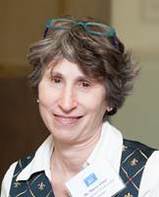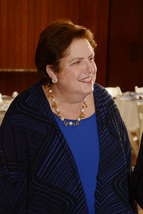
By Marya Axner
Reprinted from the Jewish Journal, April 11th
Puah and Shifrah are my two favorite characters in the Passover story, and they have a particular relevance to my work at the New England Jewish Labor Committee.
In the Passover story, Pharoah feels threatened by the Jewish people in his land. He decides there are too many of them, and he sets a policy of decreasing their numbers. He orders the Egyptian midwives to kill every Jewish male child that is born. Puah and Shifrah, two midwives, refuse to go along with the Pharaoh’s orders. They say it is impossible to carry them out because the Jewish women have their babies quickly, before they can arrive.
Puah and Shifrah have chosen the role of being allies. Allies are people who are not directly targeted by an oppressive ruler or oppressive society, but choose to take a stand on behalf of others who are being targeted.
We have all experienced what it is like to be treated badly. We are targeted at some point in our lives, or throughout our lives, as working people, people of color, women, Jews, young people, LGBT people, differently-abled people, and all the other groups I haven’t mentioned. And at the same time, we are members of groups that are not directly targeted. We have a choice as to whether we want to be allies, bystanders, or whether we want to carry out the orders of the oppressive rulers.
What was it like for Shifrah and Puah to go against the Pharoah’s orders? They took some risk. Did they trust each other enough not to turn each other in? They decided not to go along with the lies of an oppressive society, but instead, turned their hearts, minds and whole beings against the force of oppression. They had to look into themselves and decide it was more important not to sell out their own humanity. In doing so, they were standing up for themselves, as well as for the Jews.
In my position at the New England Jewish Labor Committee, I am lucky to work with the Jewish community to stand up for all workers — Jewish or not.
I have the privilege of being an ally. And as a Jew and a worker, I know what it is like to depend on allies. In Albania, Bulgaria and Denmark, Jews were saved by allies during World War II. In the Chicago neighborhood where I grew up, most of our neighbors told their children not to play with my brother, sister and me because we were Jewish. However, one family who lived next door broke from the neighborhood code and befriended us. This meant everything to my family.
If we can all figure out how to be allies, we could turn this society around in short order. We could change everything.
Marya Axner is the Regional Director of the New England Jewish Labor Committee.
Reprinted from the Jewish Journal, April 11th
Puah and Shifrah are my two favorite characters in the Passover story, and they have a particular relevance to my work at the New England Jewish Labor Committee.
In the Passover story, Pharoah feels threatened by the Jewish people in his land. He decides there are too many of them, and he sets a policy of decreasing their numbers. He orders the Egyptian midwives to kill every Jewish male child that is born. Puah and Shifrah, two midwives, refuse to go along with the Pharaoh’s orders. They say it is impossible to carry them out because the Jewish women have their babies quickly, before they can arrive.
Puah and Shifrah have chosen the role of being allies. Allies are people who are not directly targeted by an oppressive ruler or oppressive society, but choose to take a stand on behalf of others who are being targeted.
We have all experienced what it is like to be treated badly. We are targeted at some point in our lives, or throughout our lives, as working people, people of color, women, Jews, young people, LGBT people, differently-abled people, and all the other groups I haven’t mentioned. And at the same time, we are members of groups that are not directly targeted. We have a choice as to whether we want to be allies, bystanders, or whether we want to carry out the orders of the oppressive rulers.
What was it like for Shifrah and Puah to go against the Pharoah’s orders? They took some risk. Did they trust each other enough not to turn each other in? They decided not to go along with the lies of an oppressive society, but instead, turned their hearts, minds and whole beings against the force of oppression. They had to look into themselves and decide it was more important not to sell out their own humanity. In doing so, they were standing up for themselves, as well as for the Jews.
In my position at the New England Jewish Labor Committee, I am lucky to work with the Jewish community to stand up for all workers — Jewish or not.
I have the privilege of being an ally. And as a Jew and a worker, I know what it is like to depend on allies. In Albania, Bulgaria and Denmark, Jews were saved by allies during World War II. In the Chicago neighborhood where I grew up, most of our neighbors told their children not to play with my brother, sister and me because we were Jewish. However, one family who lived next door broke from the neighborhood code and befriended us. This meant everything to my family.
If we can all figure out how to be allies, we could turn this society around in short order. We could change everything.
Marya Axner is the Regional Director of the New England Jewish Labor Committee.


 RSS Feed
RSS Feed
